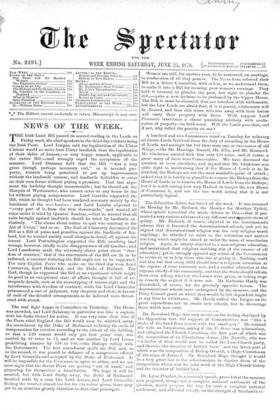NEWS OF THE WEEK.
THE Irish Land Bill passed its second reading in the Lords on Friday week, the chief speakers in the third day's debate being the Irish Peers. Lord Lurgan said the legalization of the Ulster Custom would no more hurt Ulster landlords than the legalization of their debts of honour,—a very happy remark, applicable to the entire Bill,—and strongly urged the acceptance of the measure. Lord Dunsany held that the Bill " was a very great though perhaps necessary evil," as it invaded pro- perty, tenants being permitted to put up improvements without the landlords' consent, and landlords forbidden to enter on their own farms without paying a premium. That last argu- ment his lordship thought unanswerable ; but he should ask the Marquis of Westminster, who cannot enter on any house he has let without paying compensation. Lord Greville supported the Bill, which be thought had been rendered necessary mainly by the harshness of the novi hontines ; and Lord Leitrim objected to " every part of it, from the. title downwards," and wanted all cases under it tried by Quarter Sessions,—that is, wanted that all suits brought against landlords should be tried by landlords ex- clusively. "The clause about notice to quit was contrary to the Act of Union," and so on. The Earl of Clancarty denounced the Bill as a Bill of pains and penalties against the landlords of Ire- land, but he wanted mainly small changes in detail, all against the tenant. Lord Portarlington supported the Bill, ascribing land wrongs, however, chiefly to the disappearance of old families ; and Lord Lansdowne made the extremely clever point about "free- dom of contract," that if the enactments of the Bill are fit to be enforced, a contract violating the Bill ought not to be supported. The only English Peers who spoke on the third day were Lord Carnarvon, Lord Hatherley, and the Duke of Rutland. The Earl, though he supported the Bill as an experiment which might do good in an exceptional state of affairs, thought it full of re- trograde details, such as the stereotyping of tenant-right and the interference with freedom of contract; while the Lord Chancellor pronounced a sort of judgment, very eloquent and clear, in favour of such of the detailed arrangements as he believed were threat- ened with attack.




























